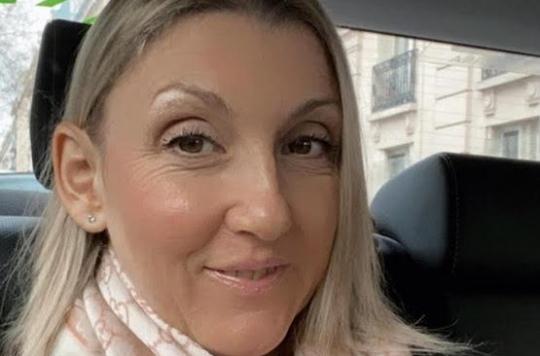Isabelle Schaal is 47 years old and has been suffering from chronic cluster headache (AVF) for 10 years, also known as suicide disease. For two years, she has succeeded in getting rid of the excruciating pain caused by this neurological pathology, which affects between 100 and 150,000 people in France, thanks to a revolutionary treatment with monoclonal antibodies. But this drug, available in France since the end of March only, is not reimbursed by health insurance. This patient is fighting for recognition of the disease and for this treatment to be supported.

– Why Doctor – What are you suffering from?
Isabelle Schaal – I suffer from cluster headache (AVF). It is a neurological disease that is characterized in two forms: episodic and chronic. When one is affected by its episodic form, one undergoes bursts of localized crises over a precise period of the year and which disappear the rest of the time. In its chronic form, which I suffer from, it is all the time. The disease never leaves you. It’s every day, every week, every month, all year round.
In addition to pain, the disease is very debilitating and cuts social and family ties at all levels. Having a giggle triggers a seizure. Crying triggers a seizure. Eating too spicy, wind, noise… everything is likely to provoke an attack. We can’t predict anything because we don’t know when crises are going to happen. Little by little, the patients withdraw into themselves. We end up doing nothing.
– How is a crisis characterized?
– When you have a crisis, there is a pain that starts from the back of the skull and encircles the skull in a helmet, that is to say which encompasses the entire skull starting from the back to reach the level of the face and the socket of the eye. The pain is getting worse and worse. When it reaches the eye, it is unbearable. The eye burns, cries. Edema may appear and swell in some. Afterwards, the pain goes down to the nasal septum and the jaw. These are not human pains. It is known to be the disease that causes the worst pain of all diseases.
For me, these sufferings are every day and every night. I have maybe an hour or 45 minutes of respite between attacks. To stop them, I do a vasoconstriction injection which is a crisis stopper and is effective in just a few minutes. The problem is that this treatment is very powerful and can lead to heart risks, so injections are limited to two per day.
– What is the cause of this disease?
– There is a genetic possibility but I don’t think it is. What is certain is that there is a dysfunction in a region in the brain, the hypothalamus, which is at the origin of the disease.
– How did AVF start in you?
– With hindsight, I think I have suffered from it since I was 20. At that time, I was suffering from its episodic form. I never cared too much about it. From 2010, I went into a chronic form and it became very difficult to bear.
– Was the diagnosis easy to make?
– I had years of medical wanderings where I consulted I don’t know how many neurologists and underwent a lot of exams. The problem is that this disease is undetectable on imaging. Before being properly taken care of, there are on average between 5 and 7 years of wandering. Some neurologists are fully aware of this disease while others are unaware of it.
– How is she treated?
– It is treated in multiple ways. The basic treatment is Verapamil and Isoptine, its generic. These two treatments are prescribed in first intention but they are used at the base to treat cardiac problems. Trials have shown that they also work for AVF. Afterwards, there is a staggering amount of other drugs. Operations are also offered such as neuro occipital implantation. It’s a box with wires that go to the hypothalamus and send electric shocks. Personally, I tried everything except the operation because I was not eligible for it due to a major skull operation.
There is no treatment that cures the disease. When you have the disease, it is for life. These treatments, in particular long-term treatments, seek to stabilize and reduce the intensity and frequency of attacks. There are also supportive treatments such as oxygen therapy because inhaling oxygen helps relieve seizures.
– There are monoclonal antibody treatments that seem to work, including one that has been available since last March. Are they really more effective?
– It’s simple. Since 2019, I have been taking monoclonal antibody treatment and since then I have had no more AVF. It saved my life. I went through all the treatments in France and seriously wondered how I was going to survive. I was never calm. I no longer saw a solution. It was while doing research on the internet that I discovered these treatments which were initially created to cure chronic intractable migraine. There are three: Aimovig, Emgality and Ajovy. They all have a French marketing authorization since 2018. Until March 22, when the Emgality was marketed for the first time, there was no way to get it in France. What I did was I looked for a neurologist who was open to these treatments to write me a prescription so that I could get them in a neighboring country. Since then, I’ve been looking for him in Switzerland. It costs me 560 euros for a single dose that must be renewed every 28 days. I injected the Aimovig and 4 days later, the seizures suddenly stopped. It was the first time in my life.
– You launched a petition which is close to 70,000 signatures. What is its purpose ?
– We need 100,000 signatures to appeal to the Senate. It is the objective. 1er January 2021, I read that France would not market monoclonal antibodies. The next day, I wrote to the Minister of Health, Olivier Véran, who, in addition, is a neurologist. In the process I launched a petition where I explain that it was not possible. We are the fifth world power, we pride ourselves on having one or even the best health system in the world, but yet monoclonal antibodies are not available, whereas they are in all the other European countries! Switzerland, for example, reimburses it at 100% for 2 years. The discrepancy is inadmissible. In France, although since the end of March there has been one available, it is not reimbursed. It costs 245 euros for a single dose which must be renewed every month.
– Are there side effects with monoclonal antibody treatments?
– Monoclonal antibodies start by triggering seizures so you have to hold on. During the four days following the injection, I had more seizures than before. For 15 months, the 4 days post injection were excruciating but I didn’t care because after that I had 20 days off. Today, I have nothing at all. I am still tired the day after the injection but my body has assimilated the antibodies and is responding well.
All other drugs have disastrous effects. We become depressed, a zombie, we have tension. The other effects of monoclonal antibodies are chronic constipation, but that’s nothing compared to the others. It’s miraculous.
.

















